Mumbai: The Sustainable Water Management Conclave 2025—Maharashtra Edition—presented by Autodesk in association with APAC Media, brought together policymakers, technologists, and industry leaders to explore how digital transformation and collaborative policy can build resilient and sustainable urban water ecosystems across Maharashtra.
The conclave was conducted in Mumbai on 30th October, 2025.
Anchored on the theme ‘Resilient and Sustainable Water Management Systems for Viksit Maharashtra,’ the discussion highlighted how technology, partnerships, and progressive policy can work in unison to build a water-secure, future-ready Maharashtra—one that leads India’s journey toward Viksit Bharat 2047.
Building Resilient Urban Water Systems

Prithviraj B.P., IAS, Additional Commissioner, Pune Municipal Corporation, Government of Maharashtra, underscored the urgent need to develop water-resilient cities through technology and community engagement. He pointed out that “the world can lose up to 6% of GDP because of water scarcity” and emphasized that India is investing nearly $200 billion in programs such as Jal Jeevan Mission, AMRUT, and Swachh Bharat.
Drawing from Pune’s initiatives, he discussed efforts to reduce “non-revenue water” losses—often as high as 40%—through improved metering and leak detection. He highlighted community-driven programs like Jal Sakhi and Jal Chetna workshops that promote water literacy and conservation.
Navi Mumbai: A Model for Sustainable Urban Water Use
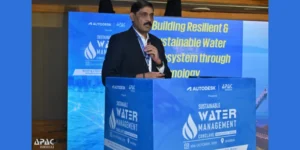
Dr. Kailash Shinde, IAS, Municipal Commissioner, Navi Mumbai, Municipal Corporation, Government of Maharashtra, shared how the city has become a benchmark for sustainable water management. He noted that Maharashtra is now “more than 50% urbanized,” and balancing water for agriculture, industry, and domestic use has become critical.
Navi Mumbai, he said, “is 100% treating the entire water” and reusing treated water for industries, construction, and the upcoming airport to “reduce the burden on fresh water.” With measures like real-time leak detection, dual plumbing, and smart monitoring, the city has achieved the status of a “seven-star rated water plus city.” He credited the success to global collaborations, saying, “The entire city was modeled on the Dutch model.”
Governance, Collaboration, and Public Participation
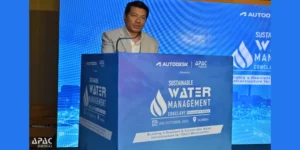
Radhabinod Aribam Sharma, IAS, Commissioner and Administrator, Mira Bhayandar Municipal Corporation, Government of Maharashtra, highlighted the need to combine technology with human capacity and awareness. He outlined four key pillars for success—capacity building, awareness, participation, and convergence—stressing that “technology alone cannot solve the crisis unless people are trained and involved.” He added, “Sustainability is not a choice, it’s a promise—for every drop and every generation to come.”
Technology as the Catalyst

Presenting an industry perspective, Nikhil Bagalkotkar, Director, Technical Sales, Autodesk, described India’s current phase as a “watershed moment” in water management. With water demand expected to rise by 50% by 2047, he said the sector must embrace digital tools like AI, GIS, SCADA, and drones for smarter project execution. Demonstrating Autodesk’s India-specific solutions, he shared how AI helped optimize the design of the Chandrawal Water Treatment Plant, saving 4,500 man-hours and €300,000.
Integrating Digital Solutions Across the Water Lifecycle
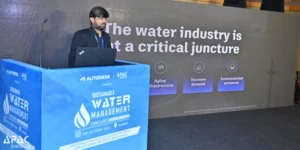
In his technical presentation, Videet Deshmukh, Product Specialist Sales, Autodesk, outlined how the company now provides end-to-end digital solutions for the entire water infrastructure lifecycle—from design to operations. He discussed tools like BIM Collaborate Pro, Info360, and Construction Cloud, which connect stakeholders on one platform and enable real-time modeling, flood prediction, leakage detection, and asset management using AI and machine learning. “Our goal is to create a connected, data-driven, and efficient water management ecosystem,” he said.
The Need for Policy, Partnerships, and Circular Economy

The panel discussion on the topic, ‘Towards a Water-Secure Future: Policy, Technology & Collaboration for Viksit Maharashtra,’ focused on policy innovation, public-private partnerships (PPP), and interdepartmental collaboration as key drivers of a water-secure Maharashtra. Panelists emphasized decentralization and a circular economy approach as crucial for sustainable water management in the state. Citing successful examples of recycled water use, panelists called for scaling such models across cities.
The conclave reinforced that sustainable water management demands a collective, technology-led, and inclusive approach—uniting governments, industry, and citizens to secure the most vital resource.
Also Read
University of Hyderabad Develops Nanotech-Based Water Purification System to Restore Musi River



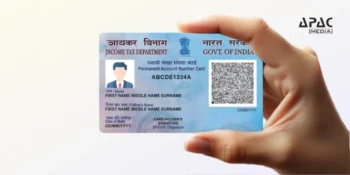

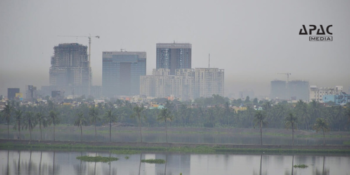
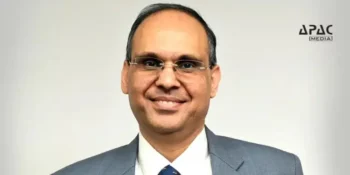
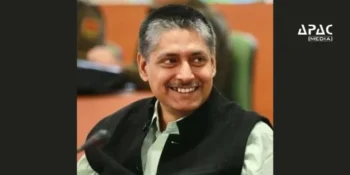


Discussion about this post